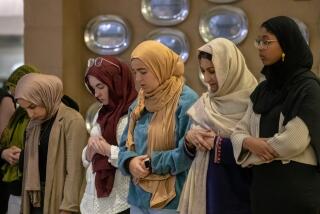Muslims Adapt U.S. Tradition for 9/11 Tribute
- Share via
Hedab Tarifi received a crash course in quilting this month.
Beginning at 5 p.m. every day for the last two weeks, Tarifi, 41, along with two other women from the Islamic Center of Southern California, worked until 1 a.m. or later, embroidering cursive letters or stitching together 98 red, white and blue fabric squares. They spent Saturday putting on borders and trim.
The women expect to send the finished quilt, with about 3,000 embroidered names listed alphabetically, to New York next month.
It is their way of remembering the victims of the Sept. 11 terrorist attacks, and reminding America that the Muslim community has suffered too. Nearly 20 other volunteers from the Islamic Center have also pitched in.
Tarifi, a Palestinian who was raised in Kuwait, said quilting was not popular in the countries where she formerly lived. But she wanted to learn the American tradition because she now considers this country her home.
“To me, a quilt was a very American idea, and it was very fitting to remember the victims,” she said. “We wanted to show not only that we are united in protecting America, but we are united also in pain.”
The names of those who perished in the World Trade Center in New York, at the Pentagon or aboard the four airplanes that crashed Sept. 11 were embroidered on a blue background decorated with tiny white stars.
“It really gives you the feeling that they are up in heaven,” said Tarifi, who came up with the idea.
Reading each name, however, was sorrowful, the women said.
“You wondered about this person. What were they like?” said Jane El Farra, 63, who worked on the quilt.
“Did they have children?” said Helen Zarif, 51, another volunteer.
The names on the quilt--such as Joseph Hassan, Margaret Lewis and Kirsten Santiago--are a reminder that terrorism did not discriminate that day, Tarifi said.
“Look at these names,” she said. “You see different backgrounds--Chinese, African, Pakistani, Indian. You look at them and you are reminded of what America represents.”
Nearly 200 people whose names are on the quilt had Arabic names.
The year since Sept. 11 has not been easy for the Muslim community, Omar Ricci, chairman of the Muslim Public Affairs Council, who assisted the women, said Saturday.
Ricci said he had considered selling his home because he was afraid of an anti-Muslim backlash. Even today, Ricci said, he is nervous about some people’s perceptions of Muslims.
“This [quilt] is a proper gesture. This is a heartfelt gesture,” he said. “I worry that people will view this as a token gesture.”
Zarif said she also had struggled. Her three children were questioned because they had Muslim names.
“People would ask, ‘How come you have a name like them? Do you believe in terrorism?’ ”
El Farra said she feared for the safety of Muslim women who wore traditional veils that cover their faces.
Despite some people’s assumptions about Muslim Americans, the community still has a duty to show they do not support terrorism, Ricci said, and this quilt is a way to do so.
“Since people of my faith [attacked America] and claimed it was a religious duty, it is my community’s job to go the extra mile and prove that it is not a part of our faith,” he said.
“We have a special obligation, both as Americans and as Muslims.”
More to Read
Sign up for Essential California
The most important California stories and recommendations in your inbox every morning.
You may occasionally receive promotional content from the Los Angeles Times.













